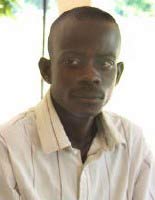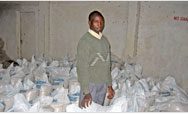You are here » Home » Telling Our Story
First Person
A community learns about prevention and supports its vulnerable children
A Village Responds to HIV/AIDS

| |
Photo: ZIHP
|
|
"In the last two years... we have seen an improvement in people responding to HIV/AIDS
education, and we have helped many orphans," said David.
|
Life is complicated in Mwenda. As in much of rural Zambia, residents here live in wood or brick huts with
thatched roofs. Most are subsistence farmers or fishermen, and all have seen the direct impact of HIV/AIDS on
their community. Mwenda's residents say they have a responsibility to care for orphans left alone by the disease.
Mwenda's neighborhood health committee — a group of volunteers that work with the local clinic to improve
healthcare and awareness of health issues — has identified HIV/AIDS as its greatest challenge. With support,
training and informational materials from USAID, in coordination with the President's Emergency Plan for AIDS
Relief, the committee has began to educate themselves on prevention and treatment and to care for their
vulnerable children.
"In the last two years I have been involved, we have seen an improvement in people responding to HIV/AIDS
education, and we have helped many orphans," explained David Numu, who is the chairman of his neighborhood health
committee. "Our village farmers donate proceeds from the sale of beans to help the orphans, and we work to find
them a home with family or neighbors."
David's committee has also started a drama club that stages anti-AIDS performances each week. With the
assistance of village and religious leaders to mobilize the community, the committee holds classes on ways to
avoid HIV/AIDS and the importance of supporting orphaned children.
Their efforts are starting to pay off. "We have seen an increase in the numbers of people coming to the
clinic asking for condoms and information materials on HIV/AIDS prevention."
David hopes their HIV/AIDS education is as successful as their recent malaria outreach. "We held classes on
how to clear away high grass and stagnant pools, and so many people are buying mosquito nets there is still a
shortage.
"Changing someone's behavior takes time. But we know we can do it."
Print-friendly version of this page (244kb - PDF)
Back to Top ^ | 

